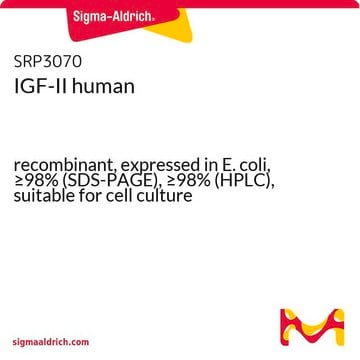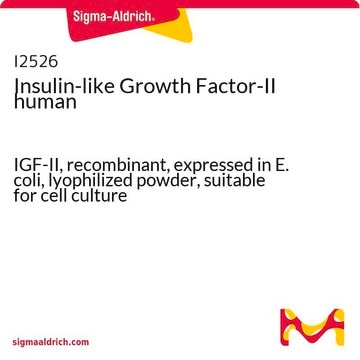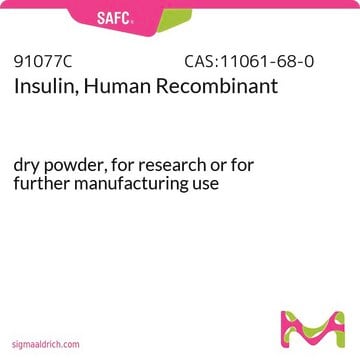SRP3265
IGF-II human
Animal-component free, recombinant, expressed in E. coli, ≥98% (SDS-PAGE), ≥98% (HPLC)
Synonym(s):
Somatamedin A
Sign Into View Organizational & Contract Pricing
All Photos(1)
About This Item
UNSPSC Code:
12352202
Recommended Products
biological source
human
recombinant
expressed in E. coli
assay
≥98% (HPLC)
≥98% (SDS-PAGE)
form
lyophilized
potency
≥2.0 ng/mL
mol wt
7.5 kDa
packaging
pkg of 50 μg
impurities
<0.1 EU/μg endotoxin, tested
color
white to off-white
UniProt accession no.
shipped in
wet ice
storage temp.
−20°C
Gene Information
human ... IGF2(3481)
General description
Insulin-like growth factors (IGFs) are predominantly produced by the liver, although a variety of tissues produce the IGFs at distinctive times. The IGFs belong to the insulin gene family, which also contains insulin and relaxin. The IGFs are similar by structure and function to insulin, but have a much higher growth-promoting activity than insulin. IGF-II expression is influenced by placenta lactogen, while IGF-I expression is regulated by growth hormone. Both IGF-I and IGF-II signal through the tyrosine kinase type I receptor (IGF-IR), but, IGF-II can also signal through the IGF-II/Mannose-6-phosphate receptor. Mature IGFs are generated by proteolytic processing of inactive precursor proteins, which contain N-terminal and C-terminal propeptide regions. Recombinant human IGF-I and IGF-II are globular proteins containing 70 and 67 amino acids, respectively, and three intra-molecular disulfide bonds.
Biochem/physiol Actions
The insulin-like growth factors (IGFs) are mitogenic polypeptide growth factors that stimulate the proliferation and survival of various cell types including muscle, bone, and cartilage tissue in vitro.
Physical form
Lyophilized with no additives.
Reconstitution
Centrifuge the vial prior to opening. Reconstitute in water to a concentration of 0.1-1.0 mg/mL. Do not vortex. This solution can be stored at 2-8°C for up to 1 week. For extended storage, it is recommended to further dilute in a buffer containing a carrier protein (example 0.1% BSA) and store in working aliquots at -20°C to -80°C.
Storage Class
12 - Non Combustible Liquids
wgk_germany
WGK 3
flash_point_f
Not applicable
flash_point_c
Not applicable
Choose from one of the most recent versions:
Certificates of Analysis (COA)
Lot/Batch Number
Don't see the Right Version?
If you require a particular version, you can look up a specific certificate by the Lot or Batch number.
Already Own This Product?
Find documentation for the products that you have recently purchased in the Document Library.
Role of IGF-I Signaling in Muscle Bone Interactions
Daniel D Bikle
Bone, 80, 79-88 (2015)
Type 1 Insulin-like Growth Factor Receptor (IGF-IR) Signaling Inhibits Apoptosis Signal-regulating Kinase 1 (ASK1)*
Veronica Galvan
The Journal of Biological Chemistry, 13325-13332 (2003)
A J D'Ercole
Endocrinology and metabolism clinics of North America, 25(3), 573-590 (1996-09-01)
The IGFs are essential stimulators of fetal and postnatal growth. Their signals are mediated predominantly by the type I IGF receptor, but another as yet unidentified receptor seems to mediate some actions, especially some of those for IGF-II. During organogenesis
Xiao-Rui Geng et al.
The Journal of biological chemistry, 289(25), 17941-17950 (2014-05-09)
Regulatory B cells (Bregs) are important in immune regulation. The factors that regulate Breg functions are less clear. Insulin-like growth factor 2 (IGF2) is capable of inducing hematopoietic stem cell differentiation. This study aimed to investigate the role of IGF2
Gui Yang et al.
The Journal of allergy and clinical immunology, 133(6), 1702-1708 (2014-04-05)
The functions of regulatory T (Treg) cells are important in immunity, and the regulatory mechanisms of Treg cell activities are not fully understood yet. We sought to investigate the role of insulin-like growth factor (IGF) 2 in the upregulation of
Our team of scientists has experience in all areas of research including Life Science, Material Science, Chemical Synthesis, Chromatography, Analytical and many others.
Contact Technical Service







